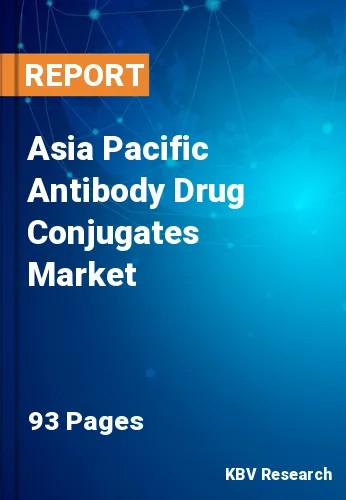The Asia Pacific Antibody Drug Conjugates Market would witness market growth of 15.0% CAGR during the forecast period (2022-2028).
Cleavable linkers are one type of ADC linker that may be cleaved by environmental conditions like pH and redox potential, as well as lysosomal enzymes. G lutathione sensitive linker (SPDB), pH-sensitive linker (hydrazone), and protease-sensitive linker are the three types of cleavable linkers employed (valine citrulline). Non-cleavable linkers are made up of stable bonds that withstand proteolytic degradation and are more stable than cleavable linkers. The non-cleavable linker's method of action is based on the ADC complex's molecularity, which is followed by the lysosome's breakdown of the mAb component, resulting in the release of a cytotoxic medicine that kills tumor cells.
Antibody-drug conjugates are made up of three parts: an antibody specific for the target-related antigen, an antigen that has limited expression on normal cells, a cytotoxic agent that kills target cancer cells, and a chemical linker that connects the cytotoxic agent to the antibody. Antibody-drug conjugates have therapeutic potential but face technological and developmental obstacles. In addition, antibody-drug conjugates are the current era of medicinal agents. It combines the power of monoclonal antibodies to target specific cells with the ability of cytotoxic medicines to kill such cells.
Cancer and other non-communicable illnesses are becoming serious public health issues in India. Such diseases are caused by poor lifestyle choices, have a long latency period, and require specialized infrastructure and human resources to treat. India continues to have a heavy burden of avoidable communicable diseases, creating competition for resources. Tobacco, eating choices, poor physical activity, and alcohol intake are risk factors for the major non-communicable diseases. It opens up the possibility of implementing combined primary preventive techniques. Population-based cancer registries inside and outside the National Cancer Registry Program have produced a picture of India's cancer pattern. It has some locations that are largely not represented, but the overall pattern appears to be consistent. For instance, according to cancer registry data, over 800,000 new cancer cases will be diagnosed in India each year. At any given time, the load is probably to be three times that of the 240,000 instances. Tobacco-related malignancies account for 35 to 50 percent of all cancers in males and 17 percent of cancers in women. The malignancies could be managed to a significant extent with primary prevention.
The China market dominated the Asia Pacific Antibody Drug Conjugates Market by Country in 2021, and would continue to be a dominant market till 2028; thereby, achieving a market value of $1,061 Million by 2028. The Japan market is estimated to grow at a CAGR of 14.3% during (2022 - 2028). Additionally, The India market would witness a CAGR of 15.7% during (2022 - 2028).
Based on Application, the market is segmented into Breast Cancer, Blood Cancer, Urothelial Cancer & Bladder Cancer, and Others. Based on Technology, the market is segmented into Cleavable Linker, Non-Cleavable Linker, and Others. Based on countries, the market is segmented into China, Japan, India, South Korea, Singapore, Malaysia, and Rest of Asia Pacific.
Free Valuable Insights: The Worldwide Antibody Drug Conjugates Market is Projected to reach USD 13.8 Billion by 2028, at a CAGR of 14.2%
The market research report covers the analysis of key stake holders of the market. Key companies profiled in the report include Takeda Pharmaceutical Company Limited, F. Hoffmann-La Roche Ltd., AstraZeneca PLC, GlaxoSmithKline PLC, Pfizer, Inc., Astellas Pharma, Inc., Gilead Sciences, Inc., Seagen, Inc., ADC Therapeutics SA, and Daiichi Sankyo Company, Limited.
By Application
By Technology
By Country
Our team of dedicated experts can provide you with attractive expansion opportunities for your business.

